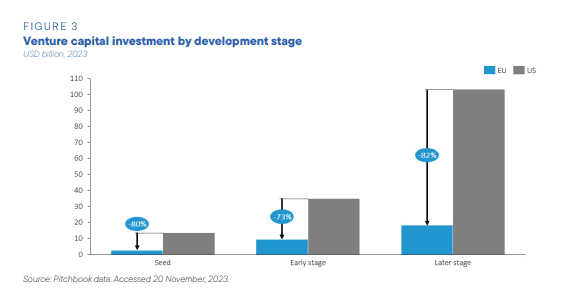European competitiveness is at risk, according to former European Central Bank President Mario Draghi. One of the three bottlenecks he identifies is the innovation gap between the U.S. and China. The main reasons for the lag are the late embrace of new digital technologies and overly strict legislation.
Mario Draghi’s report was published today and examines the issues Europe can focus on to boost competitiveness. EU Commission President Ursula von der Leyen appointed Draghi to compile this report last year.
The general idea is that European competitiveness is at risk. Initiatives appear urgently needed to change course. “If we do nothing, it will be a long agony,” Draghi stated when presenting the report.
Technology gap
The report identifies three areas of action that can help reignite growth. One is closing the technological gap that has developed over the years with the U.S. and China. Draghi emphasizes that Europe lags behind in adopting emerging technologies, such as AI and green technology, which hinders economic growth.
In the preface, Draghi states, “Technological change is rapid. Europe largely missed the digital revolution led by the Internet and the productivity gains it brought. The productivity gap between the EU and the U.S. is largely explained by the technology sector. The EU is weak in terms of emerging technologies that will drive future growth. Only four of the world’s 50 largest technology companies are European.”
Strengths AI Act undermined
So, Europe is accused of struggling to boost emerging technologies. That’s an interesting angle in light of the European AI Act, where Europe prides itself on being at the forefront of putting out legislation to implement new technology quickly and safely. Criticism on that statement is plentiful, mostly from non-European companies and analysts. This time, however, the criticism comes from the organization that drafted the legislation, the European Union.
According to the report, Europe is characterized by too many complex regulations. The biggest victims of the forest of regulations are SMEs and fast-growing sectors such as the digital industry. The result is a failure to invest in Europe, as many high-potential companies are encouraged to scale up abroad.
The report finds that the AI Act is too strict regarding the development and use of technology. This could make it harder for European companies to scale their AI solutions compared to their U.S. and Chinese counterparts, where regulations are more lenient.
“Europe has a strong position in autonomous robotics, accounting for about 22% of global business, and AI services, accounting for about 17% of business. But innovative digital companies generally fail to scale up and attract funding in Europe, reflected in a huge gap in later-stage funding between the EU and the US,” the report states.

Tip! Open-source LLMs from Aleph Alpha fully comply with AI Act
Rethinking competition rules
The rise of AI is not the only reason Europe needs to re-examine and adjust its policies. The report also emphasizes the need for mergers in Europe’s telecom sector. The sector suffers from fragmentation and a lack of scale, which weakens European telecom companies against their U.S. and Asian competitors. In a world where 5G, cloud computing, and the digitization of services are critical, it is difficult for European mobile operators to make the necessary investments to keep up with global leaders.
According to Draghi, the EU must rethink its competition rules to allow mergers between telecom companies. The economies of scale that such mergers bring will allow European companies to better compete with the big tech giants from the U.S. and China, such as Google, Amazon, and Huawei, which are increasingly influential in the digital infrastructure. These companies have the resources and scale to invest in new technologies, while the fragmented market often limits European companies. By facilitating mergers, EU countries can create a more robust and competitive telecoms landscape, ultimately benefiting both the economy and consumers.
€800 billion needed
In addition to pointing out the problems, Draghi reaches out for solutions. As a former president of the ECB, this is immediately complemented by concrete figures—in this case, the cost. That’s a hefty 750 to 800 billion euros. The money will not go entirely to investments in the technology sector, but it should free up some budget to invest in strategic sectors such as AI, semiconductors, and green energy.
According to Draghi, this amount is necessary for the EU to regain its technological edge and make a sovereign digital infrastructure independent of foreign influence. A particular focus is needed in areas where technological sovereignty is required, such as security and a sovereign cloud.
Conclusion
Draghi’s report is an urgent call to action. The economic and technological gap between the U.S. and China is wide but not insurmountable. The EU faces the challenge of regulatory reform and proactive industrial policies that encourage innovation and provide economies of scale. If Europe takes these recommendations to heart, it can not only regain its competitiveness but also play a leading role in the world’s technological future.
